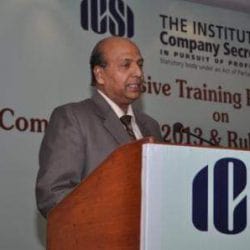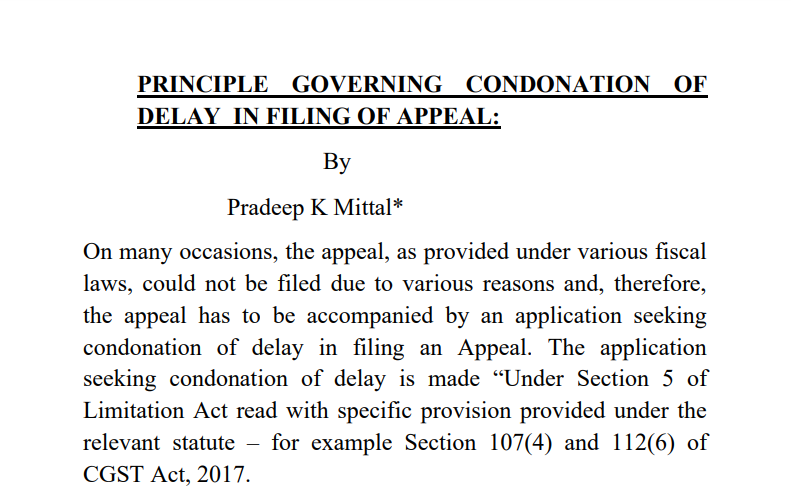PRINCIPLE GOVERNING CONDONATION OF DELAY IN FILING OF APPEAL
Table of Contents
PRINCIPLE GOVERNING CONDONATION OF DELAY IN FILING OF APPEAL
On many occasions, the appeal, as provided under various fiscal laws, could not be filed due to various reasons and, therefore, the appeal has to be accompanied by an application seeking condonation of delay in filing an Appeal. The application seeking condonation of delay is made “Under Section 5 of Limitation Act read with specific provision provided under the relevant statute – for example, Section 107(4) and 112(6) of CGST Act, 2017.
2: The word “sufficient cause”, as appearing in Section 107(4) and 112(6) of CGST Act, 2017, for the purpose of seeking condonation of delay in filing an appeal either before the Commissioner (Appeal) or before Appellate Tribunal, and also as appearing in Section 5 of Limitation Act, has been interpreted in a number of landmark judgments of the Hon’ble Supreme Court and one such judgment is Collector, Land Acquisition, Vs. Mst Katiji, MANU/SC/0460/1987, has observed as under:-
While deciding the application under Section 5 Limitation Act, the “justice-oriented approach” is required to be adopted. The expression ‘sufficient cause’ is adequately elastic to enable the courts to apply the law in a meaningful manner which subserves the ends of justice that being the life-purpose for the existence of the institution of Courts. Further, the court laid down the following principle to be followed while dealing with the application seeking condonation of delay:-
1. Ordinarily, a litigant does not stand to benefit by lodging an appeal late.
2. Refusing to condone delay can result in a meritorious matter being thrown out at the very threshold and cause of justice being defeated. As against this when the delay is condoned the highest that can happen is that a cause would be decided on merits after hearing the parties.
3. ‘Every day’s delay must be explained’ does not mean that a pedantic approach should be made. Why not every hour’s delay, every second’s delay? The doctrine must be applied in a rational common sense pragmatic manner.
4. When substantial justice and technical considerations are pitted against each other, the cause of substantial justice deserves to be preferred for the other side cannot claim to have vested right in injustice being done because of a nondeliberate delay.
5. There is no presumption that delay is occasioned deliberately, or on account of culpable negligence, or on account of mala fide. A litigant does not stand to benefit by resorting to delay. In fact, he runs a serious risk.”
3. In Popat and Kotech Property v. State Bank of India Staff Association, MANU/SC/0516/2005 : (2005) 7 SCC 510, Hon’ble Apex Court had held as under:
“7. The period of limitation is founded on public policy, its aim being to secure the quiet of the community, to suppress fraud and perjury, to quicken writ diligence and to prevent oppression. The statute i.e., the Limitation Act is founded on the most salutary principle of general and public policy and incorporates a principle of great benefit to the community.
9. Rules of limitation are not meant to destroy the rights of parties. They are meant to see that parties do not resort to dilatory tactics, but seek their remedy promptly. The object of providing a legal remedy is to repair the damage caused by reason of legal injury. The law of limitation fixes a lifespan for such legal remedy for the redress of the legal injury so suffered.
4: In the case of Manoranjan Pradhan v/s. Union of India MANU/MH/1992/2016: the Bombay High Court has held as under:-
“10. It is true that illiteracy, poverty, want of funds, ignorance of the law cannot be, as of right, held to be sufficient cause for condonation of delay, however, as has been time and again ruled by the Apex Court, it is imperative for the Courts or the Tribunals that in the proceedings where rights of illiterate, poor, down-trodden are involved, a more humane approach has to be adopted and it should not be the endeavor of the Courts or the Tribunals, or the authorities to dismiss applications or petitions merely on technicalities without looking to the merits of the case. The Railways Act is beneficial legislation meant for providing compensation to the victims or the legal representatives of the victims of the Railway Accidents. As such, in such matters, the Tribunal is not supposed to take a pedantic or hyper-technical view but is expected to adopt a humane and lenient approach. Its approach should be justice-oriented. Acceptance of explanation furnished should be a normal course in such matters unless there is some contrary evidence imputing the intention or the bona fides of the claimants making delay in approaching the Courts.”
5: In the State of Bihar and Ors. v/s. Kameshwar Prasad Singh [MANU/SC/0358/2000, the Apex Court has held that power to condone the delay in approaching the Court has been conferred upon the Courts to enable to do substantial justice to parties by disposing the cases on merits.
6. Similarly in Nand Kishore Vs. State of Punjab MANU/SC/0831/1995 : (1995) 6 SCC 614, the Apex Court has observed that if the explanation given does not smack malafide or is not shown to have been put forth as a part of the dilatory strategy, the Court must show utmost consideration by condoning the delay.
LIMITATION BEYOND MAXIMUM PERIOD PRESCRIBED IN LAW CANNOT BE CONDONED BY COURT.
7: The Supreme Court in the case of CCE, NOIDA v. Punjab Fibres Ltd., [MANU/SC/0835/2008, has observed that when Legislature has the clear intention of not condoning delay or not providing a larger period for limitation, same cannot be obliterated by reading something else in the statute or taking recourse to Section 5 of Act, 1963.
8: The Division Bench of Chhatisgarh High Court in the case of Brandavan Food Products Vs. Comm.: MANU/CG/0296/2019 has observed that no Court has the power to condone the delay beyond the maximum period prescribed under the law.
After a threadbare analysis of the provisions of law and the precedents, it was declared that once the period of limitation is specifically prescribed in a statute and stipulates the maximum period/extent of delay which can be condoned, it cannot be condoned even by the Apex Court even in the exercise of the power under Article 142 of the Constitution of India.
DELAY CAN BE CONDONED FOR THE PERIOD WHEN REMEDY PURSUED BEFORE WRONG COURT BONAFIDE.
9: Many a time, it so happens that the appeal/revision is filed before the wrong Appellate/Forum. For example, for seeking rebate on exports, if the appeal is filed before the Customs Excise & Service Tax Appellate Tribunal – though Revision Petition lies before the Revisionary Authority, Ministry of Finance, New Delhi, which has All India jurisdiction. When appeal comes for final hearing before CESTAT – maybe after 4/5 years, an objection is raised by the DR or by the Bench itself that the appeal is not maintainable before CESTAT, the permission is granted to withdraw the appeal. Then the question arises, whether the period 4/5 years which has undergone when the appeal was pending before the CESTAT i.e. before wrong Court/Forum, delay of which can be condoned by the Revisionary Authority. In that event, Section 14 Limitation Act, comes to the rescue of the party and the party can file a Revision Petition along with an application under Section 14 of Limitation Act, seeking condonation of delay in filing the Revision Petition before Revisionary Authority.
10: The Division Bench of Bombay High Court in the case of Team Global Logistics Private Limited vs. CST: MANU/MH/3540/2018, has noted and observed as under:-
The impugned order dated 15th November 2017 of the Tribunal held that the principles contained in Section 14 of the Limitation Act, 1963 i.e. exclusion of time spent bonafide in prosecuting a proceeding before a forum which does not have jurisdiction are inapplicable to statutory appeals. This has now been rejected by the Supreme Court in M.P. Steel Corporation Vs. Commissioner of Central Excise MANU/SC/0484/2015: 2015 (319) ELT 373 (S.C.). It has held that the principle of Section 14 of the Limitation Act, 1963 is applicable even when in respect of statutory Appeals filed before the Tribunal from the orders passed by the Collector of Customs (Appeals) under the Customs Act, 1962. Thus, the period of time spent in prosecuting the Petition against the order dated 13th January 2016 of the Commissioner of Service Tax has to be excluded while computing the period of limitation in filing an Appeal before the Tribunal. Undisputedly, the period between 4th May 2016 to 30th March 2017 was spent bonafide before this Court in the prosecution of Writ Petition No. 1724 of 2016.
11: In a landmark judgment, the Supreme Court in the case of M.P. Steel Corporation vs. CCE: MANU/SC/0484/2015 has observed that Section 14 of Limitation Act also applies to Tribunals and Quasi-Judicial Authorities.
Obviously, the context of Section 14 would require that the term “court” be liberally construed to include within it quasi-judicial Tribunals as well. This is for the very good reason that the principle of Section 14 is that whenever a person bonafide prosecutes with due diligence another proceeding which proves to be abortive because it is without jurisdiction, or otherwise no decision could be rendered on merits, the time taken in such proceeding ought to be excluded as otherwise the person who has approached the Court in such proceeding would be penalized for no fault of his own.
12: The Bombay High Court in the case of Vortex Engineering Works vs. Union of India: MANU/MH/3365/2018
In the light of the aforesaid order of the Supreme Court in M.P. Steel Corporation (supra), the Tribunal ought to have considered whether or not the petitioner has made out a case which would entitle it to the benefit of the principle available under Section 14 of the Limitation Act, 1963. That is to examine the facts and determine whether the delay in filing the appeal to the Commissioner (Appeals) could be condoned on the application of the above principle.
13: In case the Commissioner (Appeal) has dismissed the appeal being barred by time since the appeal was filed even beyond the time maximum time prescribed under law for condonation, an appeal could be filed before the Appellate Tribunal challenging the order of Commissioner (Appeal) and the Tribunal could hear and decide on merits – though the appeal was dismissed by the Commissioner (A) on the ground of delay.
14: In case, the application for condonation of delay has been dismissed by the Appellate Tribunal, the same could be challenged by way of a Writ Petition under Article 226 of the Constitution of India before the High Court having jurisdiction over the Appellate Authority/Appellate Tribunal whose order has been challenged. In case, the delay is not condoned by the High Court, the only remedy left is to file Special Leave Petition under Article 136 of the Constitution of India before the Supreme Court. If the delay has not been condoned by the Supreme Court, the obvious and ultimate is that the appeal would also be liable to be dismissed automatically on merits as well.
Download the copy:
 Advocate Pradeep Kumar
Advocate Pradeep Kumar
PK Mittal BCom Delhi university 1975 LLB Delhi University 1978 FCS Fellow Member of ICSI 1992 1982 to 1992 as CS in Corporate Head Legal Apollo Tyres Ltd 1986 to 1992 1993 onwards Advocate in Delhi High Court CESTAT NCLT = Practcising Indirect Tax and Corporate laws 1993 to till date. Written more than 100 Article on Company Law and Corporate laws Indirect Tax Speaker on Indirect Tax Co Law and IBC in various Seminars Workshop organised by ICAI ICSI and ICMA and other organisations Convenor Core Group on GST of ICSI









